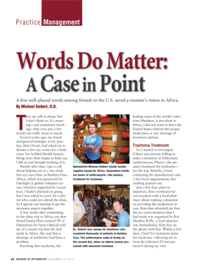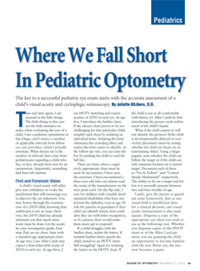Tips for Trachoma
I really enjoyed the article by Dr. Seibert about his Africa experience (“Words Do Matter: A Case in Point,” November 2010). I have traveled three times to Africa on joint humanitarian missions with the U.S. Air Force and U.S. Marine Corps. For future reference, here are some invaluable links for information on medicine donations and educational handouts (in

English, French, Arabic and Portuguese) that allow local caregivers to grade trachoma.
•
http://trachoma.org/core/sub.php?cat=resources&id=publications
•
www.who.int/blindness/causes/trachoma_documents/en/index.html
The WHO link also includes the surgical procedure guidelines in all the aforementioned languages. Chlamydia itself is also becoming a major problem on the continent.
—Carl A. Boeck, O.D., Major, USAFR/SGA, BSC, IHS/SEI
Santee, Calif.
Keeping Up with Kids
I am pleased to see the article on pediatric optometry in your November 2010 issue (“Where We Fall Short in Pediatric Optometry”). I agree with Dr. DiLibero that optometry has a unique ability to serve this population due to our diverse skills in ocular disease, systemic conditions, refraction and visual function. I also agree that visual acuity and refraction are extremely important aspects of an assessment of any patient, but am disappointed that there is no mention of ocular motor skills, binocularity and accommodation.
I contest that there are many more problems missed in these areas than in undetected refractive errors and that they have the potential to make a significant influence on the quality of life of that child now and in their future.
—Gary J. Williams, O.D.

Owego, N.Y.
Dr. DiLibero’s article, while it had much good, was incorrect on one key point. Besides the general condescending tone of the article, she also recommends prescribing the full cycloplegic refraction after instilling 1% cyclopentolate.
I believe prescribing the full cycloplegic refraction is unwise because all eyes have “tonic accommodation” of about 0.5 diopters. Tonic accommodation is the natural accommodation that all eyes have, even when relaxed. Tonic accommodation is taken away when cyclopleged but will return after the cycloplegic has worn off. I believe you would definitely be “over-plus”ing a patient if you give them the full cycloplegic refraction since the eye has tonic accommodation of 0.5 diopters. The highest amount of prescription that you should give a patient is full cycloplegic refraction minus 0.5 diopters.
—Benjamin Collins, O.D.
Grand Junction, Colo.
O.D.s—A Bunch of Idiots?
The article quoting Patrick McNeil about VSP (“VSP and Costco Begin Pilot Program,” November 2010) is nothing more than what President Truman called “gobbledygook.” His poorly constructed sentences and paragraphs should have been challenged by your editors. His statement, “VSP’s mission of driving patients into private practice doctors’ offices remains the same,” is the most illogical conclusion of VSP’s actions. He must think that optometrists are a bunch of idiots to believe him. VSP is the same type of commercial entity as Wal-Mart,
LensCrafters, Pearle, etc. Your editors should re-interview him with no holds barred.
As for the Consumer Reports’ praise of Costco (“Consumer Reports Ranks Costco Optical at Top of List,” November 2010), a wise person once said, “figures lie and liars figure.” This type of survey should include other factors. For example, the Costco in my area will not fill “difficult prescriptions,” telling the consumer to go to a private practitioner. They try to switch brands of contact lenses away from brands they do not carry.

My criticism is only of this one page, the rest of the issue is up to your usually high standards.
—Richard Rabinowitz, O.D.
sent via e-mail

